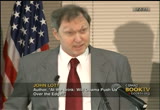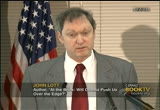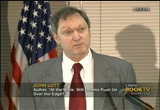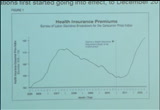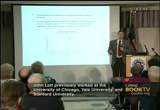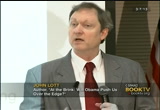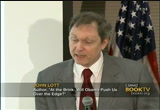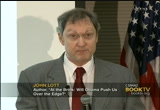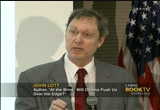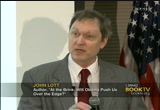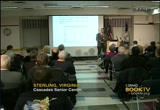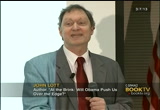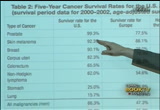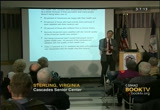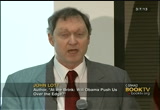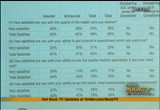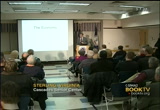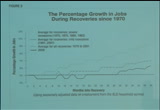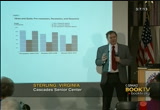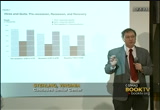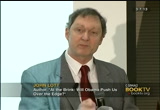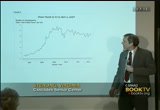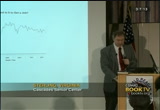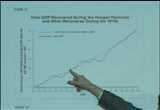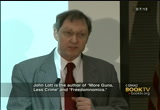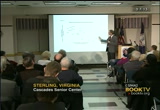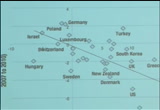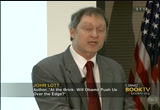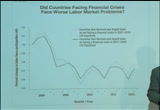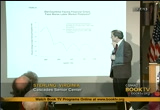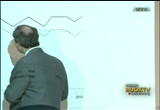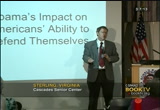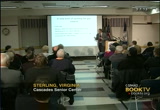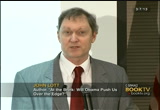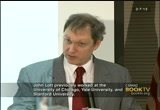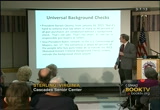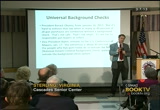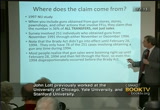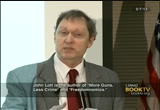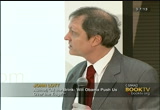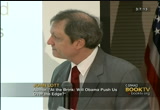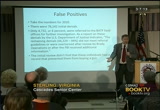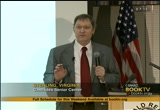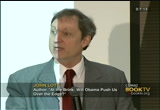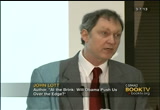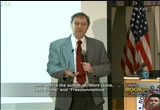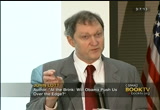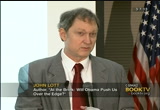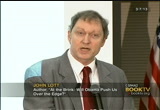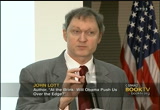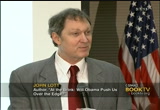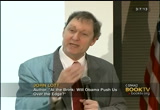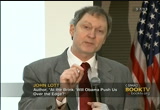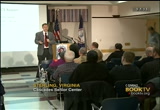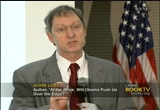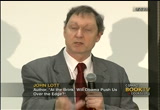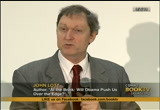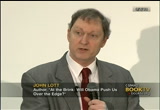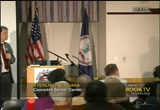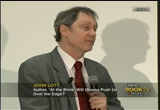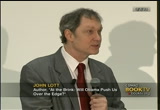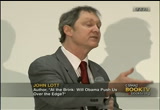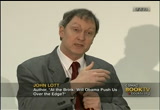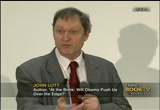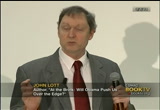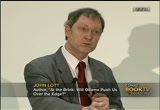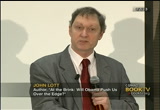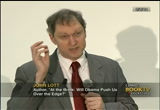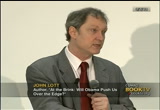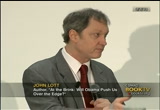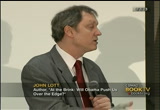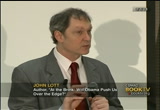tv Book TV CSPAN March 24, 2013 10:30am-12:00pm EDT
10:30 am
and please let us know about book fairs and festivals in your area, and we'll add them to our list. post them to our wall at facebook.com/booktv or e-mail us at book tv@c-span.org. >> and now on booktv, john lott argues that thanks to president obama we're on the verge of economic and social collapse. it's about an hour, 20. [applause] >> well, i greatly appreciate the chance to be here. you've had quite a few distinguished speakers in the past recently, so it's nice to, i feel honored to be added to the list. i've been asked to talk about the new book that i have that just came out just within the last two weeks. it's entitled "at the brink: will obama push us over the edge?" and i think like maybe a
10:31 am
lot of americans there's a lot of really crucial things that are happening right now. i think, unfortunately, in some areas the president's policies have permanently damaged the country. there are other areas where i think we're close, that things can still be fixed, and disaster can be averted in some areas. but i'm going to try to go through a few of the topics that i have, everything from health care to the economy generally to gun control. you know, just on gun control there's been a lot of things that have been happening over just even the past few weeks. i was in colorado a couple weeks ago, and it's the first time i've kind of heard of a white house getting involved in the passage of state legislation where the big news when i was there was, apparently, vice president joe biden had just been calling up members of the state legislature there kind of
10:32 am
lobbying them, saying that if they voted the right way, the president would help campaign for them this next year, and if they voted the wrong way, they may end up facing primary opponents. and according to legislators i talked to there, there was about seven democrats who had switched their votes enough to get four gun control bills through the statehouse. so there's a lot of things tar happening right now. -- that are happening right now. but what i'd like to try to start off with is the general issue of health care, because i think we've had the best health care system in the world, and i'm just going to briefly go through some of the changes that i think are happening and what you can expect in the next year or so. unfortunately, i think this is one area that the president's not going to compromise, and i think there's a good chance that we'll see the destruction of private health insurance in this country relatively quickly.
10:33 am
among the big changes that we've seen over the last four years is a lot of pharmaceutical companies, pfizer and merck, others have cut research staff by about 50% in many cases. we've seen huge increases since the obamacare regulations have gone into effect in terms of health insurance premiums. if you just look at it over time here, you can see these are from the bureau of labor statistics. their consumer price index numbers on the price of health care insurance, you can see it was rising up until the end of 2007 and then pretty much falling until the beginning of 2011. and then we've had over the next 24 months you've had about a 20% increase in the price of health insurance, private health insurance. and that change basically started right when the obamacare
10:34 am
regulations started to go into effect. you started seeing -- stopped seeing this drop in the health insurance premiums and this huge increase. so i don't know if you know who donna brazile is, but she's someone who ran al gore's campaign. for anybody who's been following this, her comments this past week were kind of funny because she had, apparently, gotten a big increase in her private insurance premium for health care, and she had called up her provider saying, what's going on? why did i get this big increase? [laughter] and, you know, here's the deal with that, and that is the president becauseically promised the private health insurance would be able to offer a lot more services and lower their costs. well, if that was true, we wouldn't have to man kate them -- mandate them to do that. if i could be a consultant and go to a company and say, look, i have a way that you can offer your customers a lot more
10:35 am
different services than they get right now, and it'll safe you money, they would pay you for that advice. you wouldn't have to force it on them. in the very fact that so many insurance companies objected to these regulations should tell you whether or not they actually expected to be saving the money or not. now, what's going to be happening over the next starting in january this next year, i think, is the real damage that's going to be occurring. and that is the way the changes are coming about is it'll make it so you can wait until you're sick before you have to buy your health insurance. and then as soon as you're well again, you'll be able to drop it. you can just, you can just imagine how automobile insurance would work if you could wait til you got into a car accident, bought insurance, got your car fixed and then drop it. it would no longer be insurance in that case. the cost of you buying, quote, insurance in that case would
10:36 am
essentially be the cost of you fixing the car. there's going to be a lot of people who presumably are going to feel that this is somehow gaming the system to only get the health insurance when you actually get sick, and they'll feel bad doing that. but what's going to happen is as more and more orr people drop insurance -- other people drop insurance until they get sick, the premiums are going to have to rise to cover the high cost of just only covering the people who are sick. and as the premiums go up more and more, those other people who may feel it's bad to game the system more and more of them are going to say, look, we're just essentially being shmucks here by going and having the insurance all the time. we're going to do like everybody else, and eventually the system will collapse. now, the way it was kind of sold as solving that a problem was that if you didn't buy insurance, you were supposed to go and pay a fine. the thing is you're going to
10:37 am
save so much money, and this fine isn't working out the way it originally was promised. so, for example, the cheapest insurance you're going to be able to buy when these exchanges get started is about $7100. that's for an individual. for a family of four, the cheapest insurance that the government's going to allow you to buy is going to be over $20,000. now, you compare it to what the premiums are now for individuals, it's about $5,000 for an individual, that's the average price of private insurance, so you can just see an average of a little bit over 5,000 to over 7,000, and for a family of four the average right now is a little bit over $14,000. so that'll go up to 20,000. that's just going to happen with these exchanges when they get set up next year. of -- now, so that's the cost of insurance. but you were supposed to pay a fee or fine if you didn't have insurance.
10:38 am
for somebody that makes about 50,000, that fine would be about 1600. if you make $100,000, it'd be over $2,000. but the thing is you really won't even have to pay that, even though that's already quite a bit less than the insurance would cost you. and the reason is because in the obamacare bill it's set up so that the irs, basically, will find it impossible to collect the money from anybody. you know, the irs, it sounds scary that they're in charge of collecting it, but what happens is when you read the legislation, all the normal tools that the irs has to collect, they're explicitly forbidden from using so that they can't go and attach your income, they can't go and attach your assets. all the things, the threats they would normally have are forbidden to them. the only thing they can do is if you overpay your taxes, then when you normally would get a refund back, they're allowed to keep your refund. but how do you solve that? everybody who pays income taxes,
10:39 am
you just increase your deductions so you're not overpaying your taxes. so really the trade-off isn't going to be do i pay this $1,000 fine for a lot of people versus saving $7,000 by not getting the insurance until i have to. it's going to be, essentially, paying zero fine and then going and saving the insurance premium that's there. $7,000 you'd save each year that you're healthy or $20,000 you'd save each year that your family's healthy is a lot of money to save. it's hard to believe that most people would pass up saving $20,000 a year for their family when i'm sure there's lots of other things they could go and spend their money on. but you could only imagine what happens if everybody decides that they want to go and save that 20,000. this program that was being set up as supposedly a way of making sure everybody's going to get insured is going to find very quickly that nobody's going to want to go and have health insurance at that point.
10:40 am
and real problems are going to ensue because relatively quickly then, as soon as people realize that, private health insurance will actually cease to exist. now, i just want to give you an idea of what we're giving up, what's being destroyed here. before i mentioned the pharmaceuticals, the fact is that with these huge cuts in research staffs, it means that drugs that would have been developed previously aren't going to be developed. that means lives that would have been saved aren't going to be saved. it means that people whose quality of life would have been improved aren't going to be improved. so that's, obviously, a big hit to the united states. but the thing you have to realize is that this is going to affect the entire world. the united states over the last several decades has been the workhorse, the real innovative when it comes to developing new drugs. and so it's not the quality of life that's going to be affected
10:41 am
in the united states, the quality of life in the entire world is going to be affected by these policy changes that we've seen occurring here in the united states. now, there's been a lot of discussion with the reform of the health care system saying, well, you know, maybe the united states' health care system really isn't the best. there's been a big mistake in terms of how this has been described. often the president would say look at the life expectancy. the united states doesn't have the highest life expectancy, and so you take that as an indictment of the quality of our health care system. and that's simply wrong. the reason why that's wrong is that americans can affect their life expectancy in a lot of ways that has nothing at all to do with the quality of health care. so, for example, americans get into car accidents at high rates. okay? we're risky drivers. we drive a lot, and we speed, and we do other things that are risky. hard the to blame that on health care. look at obesity. americans have a much higher
10:42 am
obesity rate than other people around the world. now, how can you blame that on the quality of our health care system? probably the best way of measuring the quality of our health care system is to ask yourself a simple question. if you have to be sick someplace in the world, where would you like to be sick? and i think when you ask it that way, hands down the united states has been providing the best quality health care. so one way of looking at it is if you get cancer, what country would you like to get cancer in? so you can look at the survival rate for people with cancer in different countries. and you can say i just have some numbers here. i have other numbers in the book, "at the the brink," but you can say what's the fife-year survival rate for people with prostate answer. in the united states it's 99.3%. that's pretty high. in europe it's 77.5. skin, melanoma cancer. it's 92% in the unite, 86% in
10:43 am
europe. breast cancer, slightly over 90% in the united states, 79% in europe. and you can go down the list here or with significant differences in every single category. it's hard to find anything, not just cancer, where survival rates are higher in europe than they are in the united states. consistently, they're much higher, and the res to have the world even larger -- the rest of the world even larger gaps exist there. so now another way of just looking at this, sorry, it's a little bit off the top there, is surveys of how happy americans are. because there's lots of things you can't just quantify in terms of just survival rate. it's the, you know, customer service that you receive, do people treat you well. and the interesting thing is americans are extremely happy with the quality of the individual health care that they receive. the surveys that you have seen
10:44 am
in the past have shown 90% rates if you ask americans are you happy with the quality of health care you receive, 90% of more thans will say yes. the interesting thing is that even the sickest americans, their even happier. if you look at things, people who are chronically ill, you'll get like 93, 95% satisfaction rates with their health care. and even more amazing is that the uninsured in the united states are generally very happy with the quality of their health care. they may not be as happy as the insured are, but be you compare it to can do -- but if you compare it to canada or other government systems, the uninsured in the united states are about as happy as those covered by government systems in other countries. you know, the problem is that people think that if you're uninsured, that's same thing as not getting health care, and it's simply not. ..
10:45 am
10:46 am
is there some other things who are losing. part of what's happening, one of the reasons why they're going to destroy the private health insurance with the regulation speefour is to first decide to the single-payer plan in a country like canada. sawicki made ebola unhappy in the united states, the uninsured with benefit because they're happy already with their health care. there's a big gap between the insured that is faith of those covered in canada and that's what would disappear. i'm pretty pessimistic about health care, but there's other things there still time to keep
10:47 am
this from -- write the brink, but it's still time to keep it going over the edge. one of those is on the economy. it may be a little bit harder to see, but this is showing the growth of jobs of recovery since 1978 basically looking at the months since the recovery started. if you look over the period of time, we can divide recovery into three categories. one is recovery after severe recession and that's the growth land here. the average recovery and is dashed line here is the growth rate of jobs after i had recovery. when you have a severe recovery a recession. you have a much bigger gain in jobs upwards. the solid line here is the growth rate is after the obama
10:48 am
recovery. after severe recession is about 12%. it's about six times mark rose in the severe recession. we can argue whether it's severe in 1980 and in some cases is worse, some cases it's not worse. if you look at the average growth rate in jobs, about 8%, four times larger than the average recovery of what we had here. we had a huge difference in terms of how many jobs have been created. the problem is even not understate how badly. the reason is you have looked into exactly what jobs have to be created. after the recession, the number of people who get hired, but
10:49 am
when you have a recovery should go. were people on average are hated each month. during this recovery we have fewer people hired each not then a recession. it sells from prior to the recession, went down during the recession and then down to be the more during the recovery. how can you have any jobs being added when you are hiring fewer people now each month then you had during the recession? the way to think about it is like water level in the pool. water coming in at water going out. the water coming in or higher. the water going out earthquake. what is the rate people quit their jobs? if you look over the course of recessions and recoveries, what usually happens is during a recession, pete don't quit their jobs. they are worried that if they
10:50 am
quit their not going to get another job someplace else. the more people who are hanging onto jobs just because they have to. after not recession yet to jobs demand for people to move to other jobs. but the recovery starts, usually rates go up. during this recovery, quit rates have gone down. they've gone down even more than in the recession. recession quit rates. so the only reason my would've had a net job despite the fact fewer people are being hired each month is the case you hadn't even bigger job in terms of people lined quit their jobs.
10:51 am
some people are very fearful that the job market out there. be the even more fearful than during the recession, which is the law. they're even less like a quit even though we should've expected a big increase in the recovery started. the more reason you can get that water level up even though you're adding a slaughter is because the number of jobs in terms of points is even lower than normal. one measure of how hard it is is to get the number of hires each month compared to the number of people unemployed and looking as well as the number of people who lived given up looking for work. you can see how the ratio has gone up and pretty much been stuck since 2009. we haven't really seen the
10:52 am
number of jobs out there matching the number of people who are looking for work. and that gives you some idea of why this quit rate has not gone up, white state so though. people have said good idea of how hard it is to go and find a job. there's two groups of people being hurt the most. people at 55 and they basically lose their jobs there's a lot of trouble trying to find it and also very young people who are in train the job market to begin with. the people in the middle hang onto the jobs they have. the new people don't have that luxury. they don't have the luxury to hang onto his job and tried to enter the workforce for the first time after they've graduated from college. now i want to show you one way to think about how bad this recovery span.
10:53 am
i'm going to show you how economic gdp income has changed during previous recessions and how it looks now. so here's what we call the trendline, the average rate of growth in the economy during the period of time and a solid line is factual gdp were. you can see this is the great depression. in 1929 to 1933, but then it increased fairly quickly and got back up. we had a very big job. what you'll see is that we've had other crashes, you know, during 1980s that falls but then quickly gets back during the 70s in the fall. you quickly get back to the trendline you have here. this is the first time that a current recovery. rather than going back to the
10:54 am
normal trendline is actually getting better. rather than where we normally would be after any recovery and where we actually are in terms of income growth is getting larger and larger with each passing month. we've never seen something like that. it wasn't true during the other recoveries we've had and it's something we really need to think about. the growth is so slow that work falling further and further behind ruth normally be at this point. one of the reasons why i wrote this book is we are in the debates at the sequester rehabbed and will be getting an a debt ceiling minutes later run. there's a lot of claims to be made the president said we just can't even cut the growth of
10:55 am
spending because if we do that's going to hurt economic growth. you look at the president's statement overtime. if you go back and actually read the presidential debate with john mccain over and over again, obama promised to make a campaign speech does the same thing. i have some new proposals, but i'm going to more than offset them by other cuts and he promised a smaller government that we have great then. now when we got to the week or two after the election we start talking about the stimulus. it will be for one, maybe two years. we had a 21% increase during the first years of the obama administration over and above the solution. that dollar increase in spending adjusted for inflation is
10:56 am
argentinian priest standing we had during world war ii, which is pretty phenomenal when you think about how much the country no place to go and fight world war ii there. this is larger for inflation. rather than the stimulus lasting for almost a couple years, not only can't we cut spending, but we can even slow the growth of spending or have a detrimental effect on the economy. obviously a shot newsome grassed a minute ago that indicated around economic growth is it going too well. the president often has made recommendations. so what i'm going to show you here is one of the graphs i have in the book. what you see here is the growth in government spending and employment if we slow the growth
10:57 am
of government spending here. on one axis we have kind of the growth in government spending kind of one year earlier in the next year what happens to employment? if you believe the president does should be associated with mark growth and jobs. in fact they increased then one year and the next year employment growth actually falls. the countries that have done well in terms of growth have been the ones relatively stingy in terms of government spending, have kept it under control. germany, luxembourg, hungary, sweden, the countries that have done well. the countries that had the biggest increase in government spending have done very poorly. the growth of employment from
10:58 am
2007. you can also look with regard to gdp should come, the ones at the biggest increase had the worst growth and tone. here's the problem and that is this notion that government then they'd goes and creates wealth. the most basic problem with that is you have to realize the money comes from someone. if the government spends our money, that means taking money from someone else in terms of borrowing or taxes taxes to reoffend if it's money that lowers the value of the dollar as a people already have. so with the government stealing is moving from where you and i would rent it. the come amazed that would've got those resources and hire those workers to the places the government wants to go. you look at this and it doesn't seem to be doing a very good job of that. there's other measures.
10:59 am
the interesting thing with krugman is when he put together the graphs in "the new york times," writing essays is the huge growth in government spending from 2007 to 2009. fact, some of the biggest creases have little adjustments down simply because they had such big increases. so we ignore the huge increases flaherty had. if you go and look at the earlier period of time when big increases were occurring, you get the same type of relationship that i was just showing a minute ago that more government spending reduces income. more government spending actually reduces employment. there's been one claim out there that it's almost become a bible for the obama administration and that is this book by or cross it
11:00 am
about saying that financial crises resulted in slower recovery. they got naysay well, do we going to find a country is having a financial crisis or not? i didn't want to get into that debate of which way they went. i just took their country, the way they define and their book for the current financial crisis and just say okay, now lets see after the books published how this countries turned out. so this is looking out countries with and without financial crises to see what happened to their employment, labor market after the financial crisis. so the dotted line at the countries they claim did not face financial crises and the
11:01 am
solid line is the one they said could face financial crises. it's all right the one with the dotted line should have been. i can't see a difference. both basically felt the same and stayed down together. when your new economics you want to say okay, let's test after the peer deeper into the dark because people complete with things a little before. it's pretty hard to call and say they get the result of what financial crises did worse. it's really interesting. this site may be hard to see, but it turns out the bad things was due to countries, ireland and spain.
11:02 am
if you look at the countries without i spain, this is their solid line appear. they did well despite having a financial crisis. they basically flat in terms of job growth. this is higher than it's been down here and you can see that -- linux without the financial crisis. so the rest of a financial crises are doing better than the ones without financial crazies in this dotted line here is for the united states. you can see we've actually done worse than almost all these other financial crises could trees here. it's hard to say because we've had a financial crisis that we can say the president's policies are responsible for. i wanted to talk about gun control because that's another
11:03 am
area that something can be done. just to summarize the economy stuff, what i hope the book does is give people answers to the claims being made. if we do, we're going to hurt the economy. but talking about federal debt about $200,000 for a family of four. publicly held debt doubles under the obama administration. we may not be a crisis quite yet but if the interest rate at historic lows right now to where the under no circumstances, could be almost $500 billion increase. and here's the problem. for five years that trying dollars deficit can quickly spin out of control because interest rates growth and people don't want to borrow going to get.
11:04 am
if interest rates go up, the united states is even worse here the deficit will go up even more. what is already in the current situation will spin out of control very easily like we've seen happen in greece and other countries. that want to talk about the impact of obama's views on the. another area where people are educated. it can make a difference just like educating people with regards to the deficits were facing and that deficit supposedly help the economy. before i get into this, we both taught at the university of chicago law school. the first time i met him i
11:05 am
introduced myself and say you are the kind of guy. as idiotic as silk. and i had no he would help me out with the city of chicago since i'd heard that. they said maybe we can get together for lunch sometime. but he kind of wrinkled his face, turned his back to me and walked away and that was the end of our first conversation. i have to say rinne two and 20 other times and it's pretty much the way all our conversations went. it is not thinking i would be getting christmas cards or anything else from him. i was not as a retired part of it is that got the strong impression when i would run into him that he viewed me as evil
11:06 am
because of the gun issue. he had very strong opinions on the. [inaudible] [laughter] i'd found something on the gun issue he disagreed very strongly about and he viewed me as evil, not just wrote. in academia, is easy to disagree with people they are. we enjoyed the process of talking about ideas i never got the impression he enjoyed talking to someone he disagreed with. were in a situation right now where obama no longer faces the threat of reelection and his view on guns he's able to give much for your brave that he would've had to worry about prior to the election. i mentioned the state of
11:07 am
colorado. i want to go through a couple things i think our import at one of the reasons i wrote the book to help educate people and the facts coming out in obama's debate. probably the most popular thing he had is the expansion of universal background checks. i have to say if you watched january 16 present t-shirt, at least to me somebody who follows numbers very close he, one thing that was amazing with every single one hour/he brought up was wrong. and it's going to go through a couple. there's other ones i talk about in the book that are related. but i'll just go through a couple things here.
11:08 am
one is with regard to 40% of background check it's hard to foresee the win as many as 40% of all gun purchases to conduct without a background check. is the consensus is 40% of people who buy guns today do so is that the national criminal background check system. here's the problem. there's a survey done during the clinton administration that claims 36% of gun transfers were done without a background. the president took the survey, rounded up, that the big problem is changing the term transfer. there's a big difference between god purchase. the vast majority of these
11:09 am
transfers are within inheritance. i don't think it would've had quite the bite of the president said look, there's too many pairing given a gun to their kid it's not going through the proper regulation. it's not as scary as saying 40% of gun sales are going ahead. and this survey was done between november 9th 291 and december december 1994. it only involves 251 individuals , that's the other problem is most of the survey was done before it even went into effect. this survey is going all the way
11:10 am
back to 1991. there's other problems i could point out with this, britishers ridley misleading. these are not going -- they would say about 13.3% and that's even though most of his theater time is done before you had the brady act going into effect. even 13.3% is much too high because gun sales have changed in so many other race over the last 20 some years. his change dramatically. people didn't even know they were dealing with a federally licensed dealer. it's not like a lot of people who would have listened as he
11:11 am
fell out of a hallmark on show. it's not like they have a sign that says i'm factor that is stealer. and surveys and most of them said they hardly got any of their customers to do with it they were federally listed are not. if that the case can 13.3% is meaningless because you're asking people whether they thought they were dealing with the place and steal about the event if they were or not. you can see for inheritances, 93% within family and over 91% of inheritance the you can see the. here's another claim made frequently. over the last 14 years of background checks have kept 1.5 million at the wrong people from getting hands on the gun.
11:12 am
schumer has made similar than 1.7 million prohibited individuals buying a gun. again that's wrong. with the correct terminology is they spend 1.7 million initial denials. so there's 1.7 million is a heck of a lot different than saying there's been 1.7 early in prohibited individuals prevented from buying a gun. let me give you an analogy that may make it clear. the late senator ted kennedy ended up getting on the no-fly list five times. apparently someone else out there with a similar name that when the senator would fly he'd keep on hitting five and would initially denied being able to go find a plane.
11:13 am
if anybody want to go and say five-time the background check system there stopped terres complained. nobody would say that. but that's essentially the way they're counting it. that's essentially the way they're counting out with regards to these background checks. if a prohibited person prevented whether or not they were the bad guy you wanted to have stopped or not who happen to have the same name are similar name to the person you're trying to prohibit. basically what you find is that it looks at the vast majority of these initial denials.
11:14 am
maybe 95% are law abiding citizens to stop when they showed. there's different stages but just look at the initial stage. in 2010 with 76,000 initial denials. about 94% of those that the first official review was because they did meet referral guidelines, were overturned after review by the brady operation or after the fbi received additional information. the last two categories are clearly possible to not meet the federal guideline to include people you thought had committed a crime. the reason you initially denied them so they can have a criminal background or some other problem
11:15 am
and that they still try to buy a gun. it could be virtually all of the other individuals who were false positives and even after those after we had the 94% drop, about 20% of the remaining 6% are clearly false positives by surveys they did in 2004. if you look at just 2010, 62 cases of 76,000 were eventually referred to prostitution. 18 of those were declined by the 44 and they ended up with 1,376,000. so here's the deal you have there. when you're talking about 1.7 million people initially denied, a lot of this may simply be in convenience for.
11:16 am
they eventually going to buy a gun. but when you're dealing with such a large number were, the problem you face is that it may be small, but it's a significant number of people who felt a need to get it done quickly for self-defense. people were being stopped or threatened and those individuals buying a gun talk about a real threat to their safety. one of the things i tried to make clear is that we talk about laws, we have to talk about boats across the benefit. everybody wants to keep a criminal from getting a gun. we have to compare how many criminals were stopped. doesn't look like. many. how many law-abiding citizens who should be able to get a gun because they haven't made similar to somebody we want to stop or wrongly prevented from buying a gun. even if it's a small percentage, that's a lot of people who are
11:17 am
being harmed by not being able to get it. the problem is this isn't the only problem. there's a number about five to seven times larger that people merely delayed, not of this initial denial category. they are delayed three days. the problem is even delayed three days for a small number of people, it also can affect their safety of a woman needs dr. threat. she may not have the luxury of waiting for five days to get a gun. my research shows define a small but statistically significant increase in aggravated assaults against women when you have even a short delay but allowed the month delay for these initial denials. that is the net effect. the benefits from waiting. , but the net effect is to
11:18 am
actually make people less. there's other issues i can get into here, or one of the key things we have as its been ripping everybody is hard to cover these multiple victim were not shooting that we've had. people talk about ulcers have different rules and laws to go and solve this problem. one thing has been left out at the discussion and that's looking at a common care principles. and they keep on occurring where guns are banned. i give you an example from last summer, which is typical, but it shows pretty clearly. you may remember the batman movie theater shooting.
11:19 am
well, the thing has been aurora, colorado, the thing is they were set in movie theaters within a 20 minute drive over showing the premiere of the batman movie. only one of the seven movie theaters had a sign banning permitted him guns. the killer didn't go to the movie theater closest to his apartment. there is one only 1.2 miles away. he didn't go to the theater that advertise privately at the largest auditorium in the state of colorado. unit thinks somebody who wants to kill a lot of people would go to the largest auditorium on a movie premiere night. the most possible that dems to attack. he didn't go there. instead he went to another theater the same distance as the one place that this banning
11:20 am
concealed weapons. he wanted to please her victims weren't able to defend themselves. if you look at the safety database with two exceptions, all the shooting said the united states had taken a place where guns are banned. at some point you would think the news media when it covers these would go through all sorts of other details. they would go mention time to time, but what's happening here. what other shooting where guns are banned. it would have a huge pat on this debate. this is the only type of gun. they take place in other places. people make comparisons in d.c., chicago, those who are gun free zones for a while. i can't find one place in the
11:21 am
world that bans gun that has seen murder rates fall. a lot of american that's a huge increase in washington d.c. and chicago. usually gun control components will say those were fair test because the musty bantams everyplace in virginia, maryland for or the rest of illinois, indiana or michigan, criminals look at gun to most places. you need to have been and everyplace. criminals can go and get guns from other places to begin with. it may explain why murder rates didn't fall by a lot. but if there may come to expect them to fall a little bit. it surely doesn't explain the increase. also you can look at other countries. as a nation that have no neighbors they can go on lame easily, readily defendable and
11:22 am
yet you still see the same increase in murder rates in violent crimes after guns are banned to the. even the whole island nation has been banned. finally i would say they really thought this was going to be the case that murder rates would go up in chicago in d.c. it would have been nice if they would've told people before hand. in fact make addictions that the crime rates are going to follow and it happens time after time and at some point i would people would say look, it can be random a couple times. the fact you consistently see increases afterward just as consistent with that. i'll mention a couple other things briefly and that is australia is often mentioned as an example a 90s they had a gun buyback in 1997.
11:23 am
the number of guns went from 3.22 max 2.2 million. it's usually not talked about is a big increase in gun sales afterwards. gun ownership now is almost exactly back to where it was, much faster than inflation. if you look at murderers, murderers in australia -- if they're right, it should have fallen and then come back. instead of basically flat for seven years and then goes down. if you look at gun suicides, it's true consumers save of falling past the buyback, but i felt they virtually the exact same amount. if the gun buyback stops australia, you should've seen it fallen and then it should have
11:24 am
gone to read it then both non-gun and gun suicides by tentacle amounts at the same time. in any case the type of stories they want to go and make. if gun ownership spell and stay down, maybe we can have some type of discussion on that. so here's the bottom line about guns and it's important for a lot of states right now. there's two groups of people that benefit the most. people who are relatively weaker physically and the people in our country who are most likely to be victims of violent crime in this overwhelming our poor blacks in high crime areas. it degrades the police were there all the time but they're not. the people who need to protect himself the most of the ones who faced the most danger it would most likely be victims of violent crime. if you see the gun control is
11:25 am
the president lobbied for colorado or other places, one thing that becomes clear is they're trying to make it costly for poor people to buy guns. if you live in d.c. it's over $500 including the price of getting a gun to go through the licensing fees and other things there. who do you think that kids are buying a gun for their protection? poor people. in d.c. it's basically poor blacks. same thing in chicago. when you look at colorado, they want to have a fee for people buying a gun there. the republicans put up two amendments. democrats voted that down and also allow people below the poverty level to be exempted from paying the fee. you would think given how democrats talk all the time but trying to help poor people would
11:26 am
jump on the notion of exempt dean people below the poverty level having to pay a tax to buy guns. but they voted unanimously that. i think these two democrats who voted the other way on that. why then would they want to impose the fee i'm buying a gun on people below the poverty level. it's pretty clear they want to ensure poor individuals are not able to buy guns, the ones mainly affected by these taxes. you see licensing fees and other things around the country have consistently refused to extend poor people. maryland, the laces and arrangement will be huge. not just to see you have to pay, the 16 hour licensing requirement, training that's very much costing hundreds of dollars.
11:27 am
i'll have one place to file for the licenses according to the senate bill. people may have to travel through for hours to get there. who was that putting the biggest burden on? if you want to make sure that white while females are the ones who will be able to go and buy guns, these democratic proposals are fine. but if you're concerned minorities in high crime areas are the ones who need detection the most, these bills will endanger the lives and safety. i realized that may not be true for most of the people in the room, but if you care about that crime i think everybody does, these are the people we need to be concerned about and the people being hungry now for this big national push. it's one of the things i hope becomes clear when people read the book. it will provide them for information. i really appreciate your time.
11:28 am
i think there's some places or damage has been done permanently. hopefully the book will provide people with the information they need to fix these other issues. thank you for your time. i appreciate it. [applause] >> we can take time for questions if you come over here to lineup. the cameras would like to get you as well and use the microphone. [inaudible conversations] [inaudible] i was curious if you had any comments about the procedural techniques of a control that they're talking about,
11:29 am
specifically psychological issues and i wonder how that candidate a gets gets into the database that will prevent a purchase of a gun and the other one is fingerprint. someone has to go down to the local police department. somebody needs to be available to do that, another way to be blocked from making a purchase. >> the mainland are the only one of the federal discussion is people with regard to mentally she's being denied. again, there's cost and benefit amounts but i hope it's talked about in these laws. only mention the possible benefits and not the cause. the benefit obviously somebody who has mental issues can represent a danger to people. even somebody like chuck schumer has implied were talking about a tiny% of people who may be listed as having these mental
11:30 am
issues represent any danger to themselves and others. it's more than that. when you add millions of names into the federal database here come you're going to create more false positives. the question you have to ask yourself, we already see how many false positives we have. how many people are we going to be stopping who do bad things versus how many law-abiding citizens who need to get it done quickly for self-defense. there's no discussion there is occurring. nobody trying to pass these bills have been a researcher discussion about the trade-off is going to be there. people who now don't get false positives are going to end up finding somebody now in the forbidden list who may have a name like there's then they will
11:31 am
find when they may need to get a gun quickly for protection they will be stopped. here's the bottom line of the window background checks can be done much more effectively. the private company has the airbase could be sued out of existence. if you want to go on strike and stop these people without collateral harms that you don't want to have stopped and it may be part of the discussion may be much easier with the chance of getting these bills passed if they really try to go in the system. the problem today the amendments might try to fix our consistently voted down. doesn't seem like he want to fix those problems they are. they just want to add more names
11:32 am
to the systems with the resulting denial of law-abiding citizens. the fingerprints or something some states have been talking about their. again, this is an issue of who are you going to be stopping for buying a day making it more difficult? i'm concerned unless you have exceptions, you'll make it so the most vulnerable people in our society, the people most likely to be victims of violent crimes are the ones who are going to be really harmed by these rules to go on protect people. >> thank you very much for those topics tonight. see the comment you were the gets involved. data manipulation. my question is my basic on either come and business
11:33 am
services provider is inherently different health care, education for transportation goods and services were supposed to pay baking or flatscreen tv construction of the laws of economics are in the government and the intervention will be given different outcomes. >> i'm an economist on about the laws have been suspended for any of those. it could make something more costly people will buy less. if you reduce the return for.jurors, you'll have fewer doctors. reduce out or some hospitals, what would have happened if the cost of medical care is going to go what. anytime you reduce the supply, the price is going to rise. that things will see more and more as as changes for every through the system.
11:34 am
ladakh just don't like the lower pay a good airport government patients. they're not going to make anyone else make decisions for them. they didn't go in here is some but it's just going to follow rules for different people would be getting them. a lot of people seem to think they're smarter than everybody else. surely people in government often seem to think that's the case. do you look at some of the things like larry summers who is obama's chief economic adviser would go and talk about too many times what it means or hysterectomies and he say you look at life expectancy results. that's not the only reason people get surgery. the main reason is because of chronic pain. why is it the government's decision to determine whether or not the value is getting rid of
11:35 am
chronic pain are not? it's a pretty important quality-of-life issue. if a chronic pain and may not have a very good quality of life and it seems that individuals are better at judging by the arab chronic pain that if somebody is going to look at the wonderment should they think is better. one of the things he learned its customers usually have better information on what they want and some government bureaucrat. there's many different issues that short-circuit the novel genesys do we get from markets that are going to be taken into account that some bureaucrat whose salary doesn't bury on the basis of whether he guesses correctly what type of things the patient's value. if i'm a doctor and don't do a
11:36 am
good job and going to lose patience. but those are going to be the types of constraints government bureaucrats will feel is directly. >> mr. lott, thank you very much. what i can't understand is all of this talk about protect the children in schools. israel had this problem back in the 70s and they solved it. there has not been a problem with children in israel being hurt like i was here at sandy hook. why on earth don't we use -- but we just don't utilize the experience that they have.
11:37 am
another thing that i wish to ask about is these people, to talk about banishing the busch race. if somebody sold -- stole a surely a paula and drove it up on the sidewalk killing 15 or 20 people, they would not say nobody gets two on a chevrolet impala. >> you bring up two important issues. issues i talk about in my book, "at the brink." look, israel not just in the 70s, but even for the country heidi vadas terrorist problems. if you look at the cherries during the 60s, early 70s, virtually all of them involve
11:38 am
bombs. there's no technological change that occurred they are. what happened was israel eventually learn that couldn't stop terrorist attacks by simply putting more police are more military on the streets. here's basically the thought process that went on. let's say you have a terrorist on a bus. the terrorist has huge strategic damage. the first thing he can do is be patient and wait until the police leave or he can tell the police first and then track of the people people on the bus. israel found it just in have infinite money. they could hire more police, but if the terrorists were just
11:39 am
patient enough to be some opening that would allow them to engage. the difference with allowing israelis to carry concealed handguns and you've had 15% of the population, he doesn't know who is supposed to go first. it could be somebody on his left, right, behind to mourn for him to be able to stop them. so that makes it very difficult. he pulls out a gun, other people pull out a gun and he's in trouble. it really doesn't give a chance for others to respond. you have to realize that the choice of using observation to before hand. when they have a choice, they chose machine gun. this evidence bill landis at the university of chicago found when they moved to bombs u.s.
11:40 am
terrorist attacks. the point has had a choice when they were forced make the change they switch to using bombs. the benefits are not just people on the street. the question i was just raised for school and other places. people don't realize prior to the federal act and the end of 1995 states that still carry laws, allow people to carry handguns on school property. if this attack had occurred before 95, there's a good chance somebody might of been there does need to carry concealed handguns. you may notice the modern school attacks we've been having started after the act in 1997. in fact, the interesting thing
11:41 am
is the person who stopped the tailor their in which two people were killed as a former marine. apparently had a concealed hand gun permit on school property up until the time of the federal safe school zone act. it would no longer take his handgun to property. you park at a quarter of a mile up the property in order to evade the best of the rule. he literally had to run a half a mile to get his gun and a half mile back. he was still able to stop the attacker about 11 and a half minutes before the police arrived. they go to the middle-school across the street where he was going to continue his attack. that time. iraq was so off at having to fire a shot.
11:42 am
there's many other cases we could talk about where citizens have stopped these attacks and have gone through many of them in my book. but the key thing here is the skies, these killers are not going around randomly. when the aurora, colorado shooting came a come as always they miss out on important things there. even "the new york times" mentioned one of the two killers there was very upset about the concealed handgun law being considered before the colorado state legislature. a former majority leader of the colorado statehouse at the time of the columbine attack told me that the boat had written state legislature opposing the concealed hand gun bill, apparently would've allowed handguns on school property.
11:43 am
one of the amazing things here is the day of the attack was the same day colorado rescheduled for final passage of a concealed carry law. just hours before the state legislature is going to vote, the columbine attack occurred there. i can go through lots of other cases, but in europe of the public shootings, even in switzerland but they allowed to consider kerry in many places is much easier than united states. a taxpayer have all occurred in very few places where guns are banned. they seem to seek out places within the dems can't defend themselves. the way to think about this is these people are committing suicides. you read their statement, look at the videotapes.
11:44 am
they want to do so in a way that people will know who they are. the chilling to is they say explicitly that i could only kill more people than such a such attacks did, the killer was apparently comparing himself to the region killer and parent of the reason he picked the school with these young kids as he thought he could kill a lot of people without being stopped. so they think they can get by media coverage by going and killing the people in the array. nobody's out here saying we should get rid of the first amendment orban media outlet from going into the news coverage of these killers are being prevented from mentioning their names. an hour after his attack, even
11:45 am
though i believe strongly that would stop or take away the benefit, but instead people instantly start talking about control that have nothing to do with the tax but with ticket so vulnerable citizens to be less able to defend themselves. >> thank you for your time tonight, sir. a very refreshing. one is that multiple states have introduced legislation to prevent state and local authorities from enforcing federal gun control laws should this pass. do you think those laws have any bearing under federal weight and at that time is coming you think money will follow their freedom principles in those states to attract people who value that protection? >> just as a first point palacio, the law is pretty clear
11:46 am
the federal government can't do one descent team. the state local officials can't say certain laws are not. the federal government can send agents in to those and enforce those laws. it may not be as enforced much, but it's not going to stop from enforcing any federal law. i don't know how significant or important it is for people are going to move. [inaudible] i was wondering if you could touch on a lot of disinformation out there about the military style semi automatic weapon that are often discussed as subject to being banned. if you could address the
11:47 am
functional differences or similarities to what are called legitimate sporting weapons. >> one of the other questioners at the two-part question i only got to the first part. that is what, is pretty much a made-up term. there's three different types of guns. ashamed to, automatic. when pulled the trigger lots come out. semi automatic, when will it comes out, reloads itself. then there's manually loaded, something like that. military weapons and machine guns like an m-16 has a machine gun with one pulled the trigger several bullets come out of funds. it makes no sense to ban guns on
11:48 am
the basis that the way they look. they are 50 and looks like an m-16, but the military in the world with these nar 15 because the wave function is exactly the same as the hunting rifles are talking about. they fire the same bullets at the same rapidity doing the same. if you want to ban the gun, don't just ban the ones that look a particular way. that's the problem with senator frank same is happening with your bill. block of academics have looked at the clinton administration and they didn't find any benefit in terms of crime rate. it didn't change. the only guns are banned were the ones that put the way they function. that also covered magazine
11:49 am
faces. but i don't think the president wants to go and try to argue banning all semi automatic. he must military weapons, which is incorrect. you know, the reason why he doesn't is because most gun in the united states who could classify semi automatic weapons and people know the benefit. if you had action we kept on pulling back and looking at yourself, you're not going to do a fire very quickly. i found seven cases in december without trying for at least 10 shots were fired by victims to defend themselves and that's because you'd have three or four burglars break and simultaneously into their home. i think the president wants to make that claim. instead they go after small group of weapons based on how they look and i think they're going to have a hard time at the
11:50 am
state level is a different story. >> thank you so much, dr. lott. >> thank you so much. appreciate it. [applause] >> the system of mass incarceration is now so deeply rooted in our social and political economic structure that it's not going to debate away or downsized out of sight without a mixer match your country major upheaval of a radical shift in the public consciousness. i know there's many people here today who will say there's no
11:51 am
hope of ending mass incarceration in america. there's no. pick another issue. just as many people were signed to jim crow in the south and say yeah, that's a shame, but it's just the way it is. i find so many people today be the millionth second in and out today is just an unfortunate but alterable fact of american life. i'm quite certain that the king would not have been so resign. i believe that if we are truly, truly to honor dr. king, if we are to ever catch up, we've got to be willing to continue his work. we've got to be light to go back and pick up where he left off and do the hard work of movement
11:52 am
building on behalf of poor people of all colors. in 1968, dr. king told advocates the time had come to transition from the civil rights movement to the human rights movement. many photo-quality could not be achieved through civil rights allowed without basic human rights, the right to work, the right to quality education. civil rights are empty promise. in honor of dr. king and all those who labor to win the election crow, i hope we will commit ourselves to building a human rights movement to end mass incarceration. a movement for education, not incarceration. a group that for jobs, not jails. is limited and we limited analytical discrimination against people. discrimination that denies basic human rights to work, shelter
11:53 am
and two food. what a sweet deal? first we've got to begin by telling the church, the wiltshire. we've got to be willing to admit out loud that we as a nation have managed to re-create a catholic system in this country. we got to be willing to tell the center places of worship, behind artist and inventor center. we got to be willing to tell the truth so great awakening to the reality of what has occurred can come to pass. the reality is this new catholic system doesn't come with signs. there are no signs today of hurting us of the mass incarceration. presents today are out of sight out of mind. often hundreds of miles away
11:54 am
from communities and families that might otherwise be connected to them. the people who cycle in and out of these prisons typically live in segregated, impoverished communities. communities that middle-class folks, upper-middle-class folks rarely come across. so you can live your whole life in america today having no idea that the system of mass incarceration and the harm it reeks even exist. we've got to be willing to tell the truth about what has occurred. pull back the curtain and make this about what it meant playing site so that an awakening came again and people can begin to take the kind of creative constructive action at this moment in our history surely requires. but of course it's a lot of talk
11:55 am
in conscious reasoning isn't going to be enough. for that to be willing to get to work. in my view that means we've got to be willing to build underground ragas for people, and underground railroad for people who want to make a genuine for real freedom. people who want to escape the system and find work, find shelter to support their families. find true freedom in america today. we've got to be willing to open our homes, open our schools, open our work visas to people returning home from prison and provide safe places for families who have loved ones behind bars today. how do we create the same places? one thing we can currently do is begin to admit or criminality out loud.
11:56 am
the truth is if i made mistakes in our lives. all of us are sinners. all of us have done wrong. all of us have broken the law at some point in our lives. if you're an adult, you've broken the law at some point in your life. i find some people say i'm a sinner. i've made mistakes, but don't make me a criminal. i say okay, well maybe he never drank underage. maybe never experimented with drugs. the worst thing you've done in your entire life is the 10 miles over the speed limit on the freeway can be put yourself and others at risk and harm the someone's smoking marijuana in the privacy of their living room. but there are people in the united states serving life sentences for first time drug is
11:57 am
the u.s. supreme court upheld by sentences for first-time drug offenders against an eighth amendment challenge to such sentences were cruel and unusual in violation of the eighth amendment. the supreme court said no, it's not cruel and unusual punishment to sentence a gunman to life in prison for first-time drug offense even though virtually no other country in the world does such a thing. we've got to end the idea that the criminals are then not as an instead say they are bad for the grace of god go i. all of us have made mistakes in our lives, taken wrong turns, but only some of us have been required to pay for those mistakes the rest of our lives. in fact, president barack obama himself has admitted to more than a little bit of turkey is in his lifetime. he's admitted to using marijuana
11:58 am
and in his youth. if we had erased by white grandparents in hawaii, if he hadn't done much of illegal drug use in predominantly white college campuses and universities come if he had been raised in the hood, the odds are good that he would've been stopped, he would've been first in search and caught and far from being president of the united states today, he might not even have the right to vote depending on the state he lives in.
94 Views
IN COLLECTIONS
CSPAN2 Television Archive
Television Archive  Television Archive News Search Service
Television Archive News Search Service 
Uploaded by TV Archive on

 Live Music Archive
Live Music Archive Librivox Free Audio
Librivox Free Audio Metropolitan Museum
Metropolitan Museum Cleveland Museum of Art
Cleveland Museum of Art Internet Arcade
Internet Arcade Console Living Room
Console Living Room Books to Borrow
Books to Borrow Open Library
Open Library TV News
TV News Understanding 9/11
Understanding 9/11
